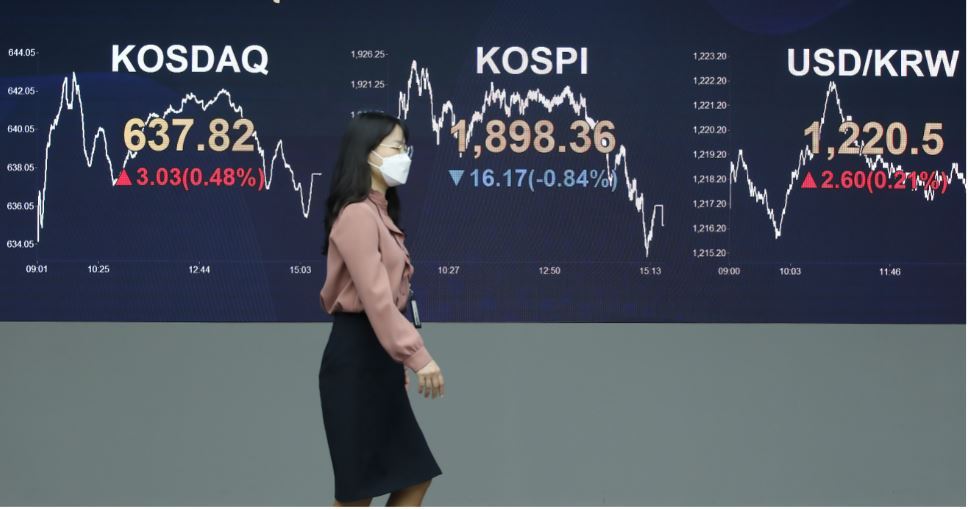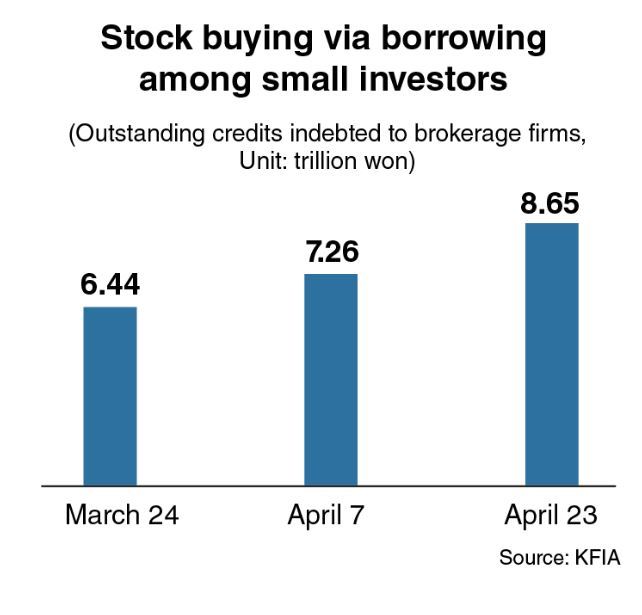[News Focus] ‘Debt-based’ stock purchases surge 34% in one month
Kospi risks grow as small investors actively borrow from brokerages
By Kim Yon-sePublished : April 26, 2020 - 11:56

SEJONG -- Stock investments are often likened to a zero-sum game, as winners take the money of losers. It is impossible for every participant in the capital market to see capital gains even if the market is bullish, as their buying and selling timing is various.
Further, the probability of becoming losers grows when individuals use credit-based purchase, which is dubbed the “leverage” investment. This allows investors to buy more stocks beyond their cash deposited at accounts. Brokerage firms pay for the credit-based stocks, like the case that credit card firms pay for goods immediately instead of cardholders.
This type of high-risk trading -- in which small investors are obliged to pay back in cash for the credit-based stocks or sell those within a certain period -- has increased by more than 2 trillion won ($1.63 billion) over the past month.
The Kospi, which traded at over 2,000 points in early March, dipped below 1,500 on March 19 in the wake of the novel coronavirus, which hit South Korea and many countries around the globe.
But the benchmark index has recovered to trade above 1,850 since mid-April, showing extreme volatility within just a month.
A certain portion of small investors (mostly Koreans) are estimated to have been successful in taking the money with high gains up to 50 percent or more if they bought stocks in mid-March and sold those a month later.
But individuals, who were holding stocks when the index traded above 2,000 and sold between March 6-19 in their bet for further falls of the Kospi are considered to be losers. The index dropped from 2,040.22 on March 6 to close at 1,457.64 points on March 19.

There could also be those holding their owning stocks irrespective of the plunge or who purchased more at lower prices. This trade without confirming real capitalized losses was possible as long as they bought all of their equities in immediate cash payment.
But those who had borrowed to buy stocks are estimated to have suffered “automatic sell” orders regardless of their intention when the Kospi plummeted in mid-March, as the ratio of capital value of the credit-based stocks to the money brokerages paid in advance is estimated to have stayed under 140 percent -- the standards set by the lenders (brokerages). Huge losses were inevitable in that case.
On the other hand, cash-based small investors and local or foreign corporate investors could rake in the stocks sold via automatic (or compulsory) sales at lower prices.
“Some individuals gain higher than foreign corporate investors (or foreign funds). In contrast, those actively using the leverage investment have frequently been the target of local and foreign corporate investors,” said an official of the Financial Supervisory Service.
Some past data showed that the index often started falling when the volume of credit-based buying among individuals was growing.
Their outstanding borrowing balance -- which scaled back in mid- and late March due to the en masse automatic sale or other factors -- has continued to mount again recently.
According to the Korea Financial Investment Association, retail investors’ outstanding balance for unpaid stock-purchase increased for the 20th consecutive trading session to reach 8.65 trillion won as of Thursday on a collective basis for the first-tier Kospi and secondary Kosdaq.
Compared to the balance of 6.44 trillion won on March 24, it marked a 34.3 percent (2.21 trillion won) increase in a month.
Some market insiders are issuing warnings over investing via the leverage in this sort of crisis. Some raise the possibility that the bourses could experience a “double dip,” sinking again after seemingly normalizing to a certain level.
Their worries reflect feasible recession in the local and global economies amid the uncertainty over the COVID-19 crisis.
Over the past three months since the first COVID-19 case was reported in Korea on Jan. 20, foreign fund investors net-sold stocks worth 21.17 trillion won on the first-tier market while small investors net-bought 22.82 trillion won worth. Local fund investors net-sold 7.9 trillion won.
A brokerage industry worker said that state pension funds including the operator of the National Pension Service might have defended the market via active equities-purchase for weeks until before the April 15 general election. “The political issue is over. The Kospi is projected to reflect economic indices,” he said. This means aggravating risks particularly for debt-based investors, who have little capacity for a long-term stockholding.
The de facto jobless number has reached an all-time high of 4.27 million people as of March, while first-quarter gross domestic product growth posted negative 1.4 percent compared to the previous quarter.
The nation’s exports fell by 26.9 percent during the first 20 days of April, compared to the same period of 2019. In addition, many industrial sectors such as tourism, airlines and retail services have been critically hit by the pandemic.
By Kim Yon-se (kys@heraldcorp.com)








![[Graphic News] More Koreans say they plan long-distance trips this year](http://res.heraldm.com/phpwas/restmb_idxmake.php?idx=644&simg=/content/image/2024/04/17/20240417050828_0.gif&u=)
![[KH Explains] Hyundai's full hybrid edge to pay off amid slow transition to pure EVs](http://res.heraldm.com/phpwas/restmb_idxmake.php?idx=644&simg=/content/image/2024/04/18/20240418050645_0.jpg&u=20240419100350)





![[From the Scene] Monks, Buddhists hail return of remains of Buddhas](http://res.heraldm.com/phpwas/restmb_idxmake.php?idx=652&simg=/content/image/2024/04/19/20240419050617_0.jpg&u=20240419175937)

![[KH Explains] Hyundai's full hybrid edge to pay off amid slow transition to pure EVs](http://res.heraldm.com/phpwas/restmb_idxmake.php?idx=652&simg=/content/image/2024/04/18/20240418050645_0.jpg&u=20240419100350)

![[Today’s K-pop] Illit drops debut single remix](http://res.heraldm.com/phpwas/restmb_idxmake.php?idx=642&simg=/content/image/2024/04/19/20240419050612_0.jpg&u=)